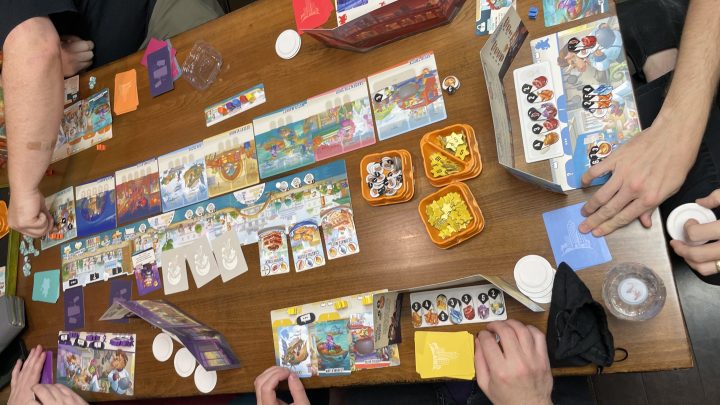
How Kickstarter became a marketing tool for board games

On a Tuesday evening in October, about two dozen people gathered in the back room of Geeky Teas & Games, a board game store in Burbank, California, to celebrate the successful Kickstarter launch of a game called Critter Kitchen.
The game involves gathering “ingredients” for meals by moving around little “zoo chef” tokens. There are characters with punny, animal-themed names like Martha Shrewart and Bobcat Flay. It’s the kind of strategy game with lots of little pieces and a big, fat instruction manual.
In the first 12 hours of Critter Kitchen’s Kickstarter campaign, more than 3,000 backers pledged $40 to $160 each for a product that won’t be delivered until December 2024.

“Crowdfunding lets you put your idea out there and make sure that you’ve got a lot of response to it before committing your capital and publishing something,” said Brad Brooks, co-founder of Cardboard Alchemy, the publishing company behind Critter Kitchen.
When crowdfunding through platforms like Kickstarter became a thing more than a decade ago, the idea was to help investors, designers, filmmakers and other creatives raise money for projects from their communities instead of traditional investment.
To date, around 40,000 games have been funded through Kickstarter. The company says most successfully funded projects raise less than $10,000, but that a growing number have reached six or more figures.
But these days, crowdfunding is more than just a fundraising tool for game makers — it’s a marketing tool too.
“It’s both, it really is,” Brooks said. “It’s how you can make everyone aware of your project and basically throw a party online for everybody to come and see it and participate.”
When backers contribute to crowdfunding campaigns, they normally receive early or deluxe copies of games.

Eric Eikmeier, one of Geeky Teas & Games’ co-owners, said that’s one reason the store has backed about 200 Kickstarter projects, plus a few more on competing crowdfunding platforms.
“It’s an opportunity to have deluxe-ified copies of games, exclusive promos, things of that nature,” he said.
As a retailer, Eikmeier said choosing which games to back is “a bit of an art and a little bit of a science,” but that it’s an easier decision when there’s involvement from established creators or game publishers.
“I do think that there is space for new creators to successfully crowdfund,” he said. “That said, it’s a lot harder for them to rise above the noise floor, because there are large companies who are primarily using Kickstarter as their engine to drive new game sales as compared to somebody with a dream and computer.”
The number of successful Kickstarter campaigns for tabletop games nearly doubled over the past five years, according to an analysis by Polygon. To rise above that “noise floor,” significant “pre-launch” resources go into crowdfunding campaigns.
“We are hiring out freelance graphic designers, artists, modelers, animators because crowdfunding demands that it looks really good right out of the gate,” said Peter Vaughan, Brad Brooks’ business partner and Cardboard Alchemy’s co-founder.
Critter Kitchen wound up raising a million dollars from more than 13,000 backers on Kickstarter. But the campaign was in development for eight months before raising a single crowdfunding dollar.

The Cardboard Alchemy team sent prototype copies of the game to reviewers, introduced it at events and designed merchandise to entice backers to pledge more money.
Brooks said the company spent close to $70,000 on Facebook and Google ads during Critter Kitchen’s campaign.
“You’ve got to do the work ahead of time to get out there and market your game, make people aware of it, so they are waiting at the door when you start the campaign,” Brooks said.
That is modern crowdfunding.
And then, there are those people with dreams and a computer.
“I’ve got a game myself,” said Alistair Milne, one of the attendees of Critter Kitchen’s launch party. “It’s called Fear the Kraken, and it’s about building a Kraken and sinking boats.”
Milne said he began developing the game more than two decades ago but still hasn’t released it into the world.
“I have to do the whole Kickstarter thing,” he said. “And I know nothing about it.”
Milne said he’s been reading books and forums about crowdfunding, but “the amount of detail is just overwhelming.”
Even so, Milne said he still believes in the spirit of crowdfunding and has backed a few games on Kickstarter himself.
“Collectively, you help this person get something made and bring something new into the world,” he said. “What’s not to like about that?”
There’s a lot happening in the world. Through it all, Marketplace is here for you.
You rely on Marketplace to break down the world’s events and tell you how it affects you in a fact-based, approachable way. We rely on your financial support to keep making that possible.
Your donation today powers the independent journalism that you rely on. For just $5/month, you can help sustain Marketplace so we can keep reporting on the things that matter to you.

















